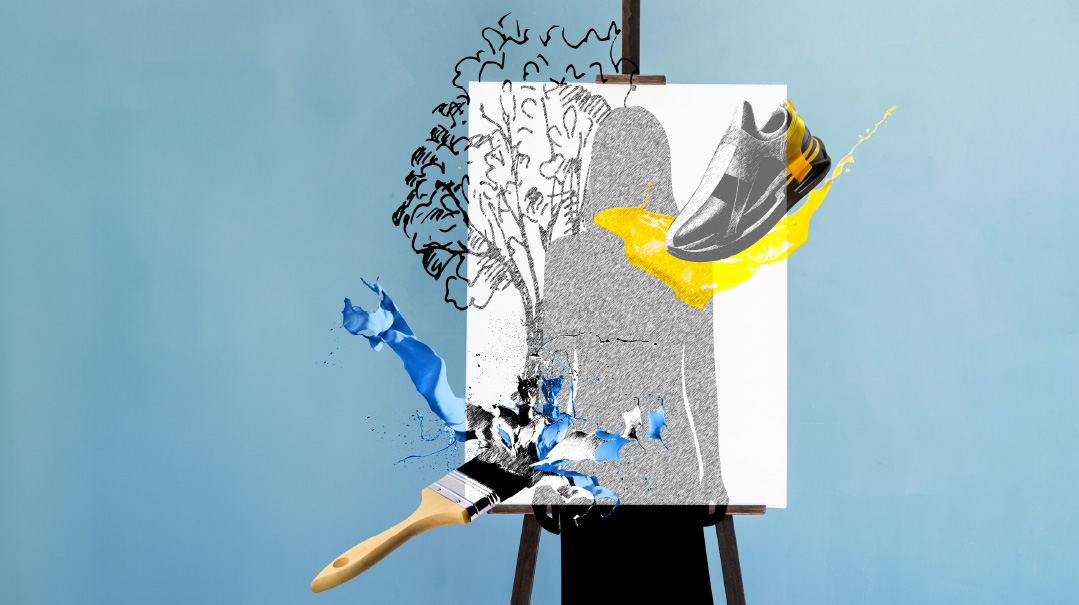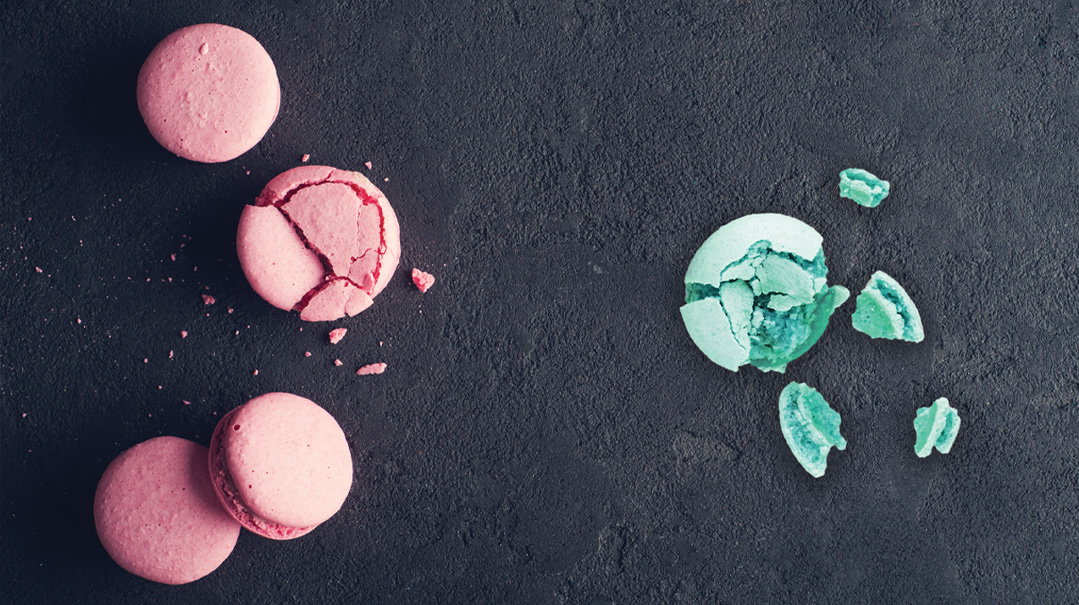The Wonder in Wonderful
| August 29, 2023Honestly, I felt the world had enough color in it, and didn’t need me messing up its palette

From somewhere in the house, the phone rang.
Mommy entered the room, sounding bored. “Perel, it’s for you.”
Of course. The phone always rang for Perel. I gripped the paintbrush in my hand and dared it to snap in half. I focused on blending colors on my newest creation as Perel rushed out of the room, squealing on the phone.
But Mommy wasn’t finished. “The camp called me back.”
I waited.
“You’re accepted, and you’re going.”
This time, the paintbrush did snap.
After that, the world wouldn’t let me forget what was looming. Mommy ordered shirt labels and towels. Perel belted out old camp songs and washed her organizers. Even the stores outside blared their camp sales in flashy neon signs.
I wanted to scream.
Instead, I wrapped my paints and brushes carefully and stuck them inside the new duffel bag that lay on the floor like a dead body. But Mommy was at the door, and she snatched them away.
“You are not taking them along,” she said. Seeing my distress, she lifted my chin with a finger. “Oh, honey, you’ll have an awesome time without painting. I want you to experience real life. I want you to put color into the world in your own way.”
I looked up, surprised.
“You’ll see the wonder in wonderful… without them.” And Mommy put the paints into my drawer and closed it firmly. But the night before camp, in a moment of panic, I dumped them back into my duffel.
Honestly, I felt the world had enough color in it, and didn’t need me messing up its palette. On the bus to camp, sceneries blended with one another; first dull and flat, then bright and mountainous. When I saw the camp for the first time, I nearly winced from the intensity of it all. Red slashes on the bunkhouses. Green fields crisscrossed by gray paths—
“Eeeek! You’re in caaaamp!”
I gasped and clutched my ears in pain. I whirled around to see the head counselor grinning into her megaphone. Had she really just screamed in my ear? I turned away in disgust. Even she was dressed in an obnoxiously colored costume.
Then there were many more megaphones, yelling and screaming and herding all campers into the dining room. I was jostled by hundreds of other Perel-like girls, all colors and squeals and movements. After being shoved into (“Sorry!”), accused (“That’s my doughnut”), and reprimanded (“Wrong bunk!”), I felt overwhelmed. I gripped the table and watched the head counselors act silly onstage. I tried not to show how I felt inside.
When the dancing started (seriously! All these people in one room!), I grabbed the opportunity to snatch the nearest doughnut and flee the shaking dining room. Outside, the sun was already setting, adding more colors that were jarring to my already crowded senses. I sat on the steps outside and chewed calmly, peering around at the camp. Should I give it a second chance? Perhaps. My gaze swept over everything again, and just like that, my face froze. I nearly dropped the doughnut.
Because, smack in middle of the camp, was an ugly, brown… wall.
I stood up. “What is… that?”
“That’s camp,” a voice announced.
I clutched my ears protectively, in case the voice belonged to a body that held a megaphone, but it was only a regular girl who stood staring at me. I stared back at her, then awkwardly dropped my hands.
“I… uh, no — I was wondering about that brown wall.” I pointed at it.
She smiled. “Ha! That’s a paddleball court. Never played it before? Don’t worry, we don’t play it in camp, anyway.” She looked at me twice. “Hey, aren’t you in my bunk?”
I was, and her name was Risi. She spoke a lot. She helped me make my way back into the madhouse, sorry, dining room, and later walked me to our bunkhouse, chatting about our counselors and the program and why this camp’s food was the best. I listened with half an ear, honestly, but not because it had been blown off by the megaphone. Instead, I couldn’t stop thinking about the paddleball court and its brown wall.
I had an idea.
My chance came on Paint Day. Equipped with megaphones, the entire camp was shrieking and running around at the other end of camp. Since their attention was diverted, it was easy to pilfer the little cans of paint they had used earlier to pour on each other, along with some paintbrushes. I hauled everything back to the paddleball court and stood staring up at its massive brown wall.
I grinned. I dipped a paintbrush in and made the first streak across the wall.
“You. Are. So. Not.”
Risi stood behind me, looking on in shock. Then she added, “Doing. This. Without. Me.”
I giggled. Risi grabbed another paintbrush and added her own streaks of color to the wall. This time as we worked it was I who spoke. I guess pouring out paint helped me pour out my own words. I spoke about how camp seemed so annoying and overwhelming. Then I spoke about the wonder of a plain white paper or canvas, how it was like a world unexplored and waiting with adventures, if only we would try to find them.
Risi grabbed my arm. “Oh, don’t you see?” she asked.
I looked at the wall. “Yes, and it’s beautiful.”
“Not that, silly. Look at what you said.” She held my hands tightly and turned me to face her. “You’re so willing to try new things on paper, but I think a true artist tries new things in her life, too.” She breathed heavily, but her voice softened. “I think Hashem would want that from you. Don’t you think you can try something new… this summer?”
I stared back at her and wondered how I could have possibly thought she was just a regular girl.
Megaphones interrupted us; the camp was returning from their paint war. When they saw what we’d created, it was like the first day of camp; the counselors shrieking and yelling into their megaphones. Risi and I held hands in victory; we shrieked and yelled right along with them. And it was wonderful, indeed.
But even more wonderful was that Risi never let go of my hand. She held it as she urged me to race to the dining room. “Run!” she yelled, and I broke into a sprint beside her. “Dance!” she yelled, and I jumped to the beat of the song. “Throw!” she yelled, and I threw that ball with all my might.
Maybe my senses had dulled, because the colors and sounds no longer jarred me. Or maybe they’d become brighter and matched the tone of this new world I was a part of. The head counselors were no longer silly; they were actually quite funny. But without their megaphones.
She held my hand for the last time that summer on the last day of camp, when once again there were annoying megaphones spouting instructions, confusion, and noise, and hundreds of girls running around. But this time I stood amid them all, unfazed.
“Wasn’t it wonderful?” Risi asked. We looked at that paddleball court wall for the last time.
“Risi,” I said, “you are the wonder in wonderful.”
There was that image of her smile, against our painted wall, slipping away past the camp’s black gates, slowly at first, then quickly, as the bus lurched down country roads on its way back to the city. I was sitting in the back row, gazing at the retreating scenery of the countryside, until the city’s silver buildings rose up before me.
I was home.
In the sudden stillness, Perel and I emptied our duffels and there, at the bottom of my bag, I discovered my paints and brushes. Untouched. I gasped over them and realized I hadn’t needed them at all. Camp was over; I could go back to my paints. But somehow, I didn’t feel that I needed to.
After that, the world wouldn’t let me forget that school was looming. In the rush of ordering supplies, buying new shoes, and taking old uniforms to air out, it was almost hard to believe I’d ever been in camp at all.
After the first few days of school, sitting in our room with our homework before us, Perel began belting out this year’s camp songs. I sat and listened, thinking how the academics seemed to clash with my carefree summer memories. Meekly at first, then confidently, I joined her.
It hit me then. I really, really missed camp. I missed Risi.
From somewhere in the house, the phone rang.
Mommy entered the room, slowly, sounding surprised. This time, she looked at me, not Perel. “It’s for you.”
(Originally featured in Teen Pages, Issue 976)
Oops! We could not locate your form.







